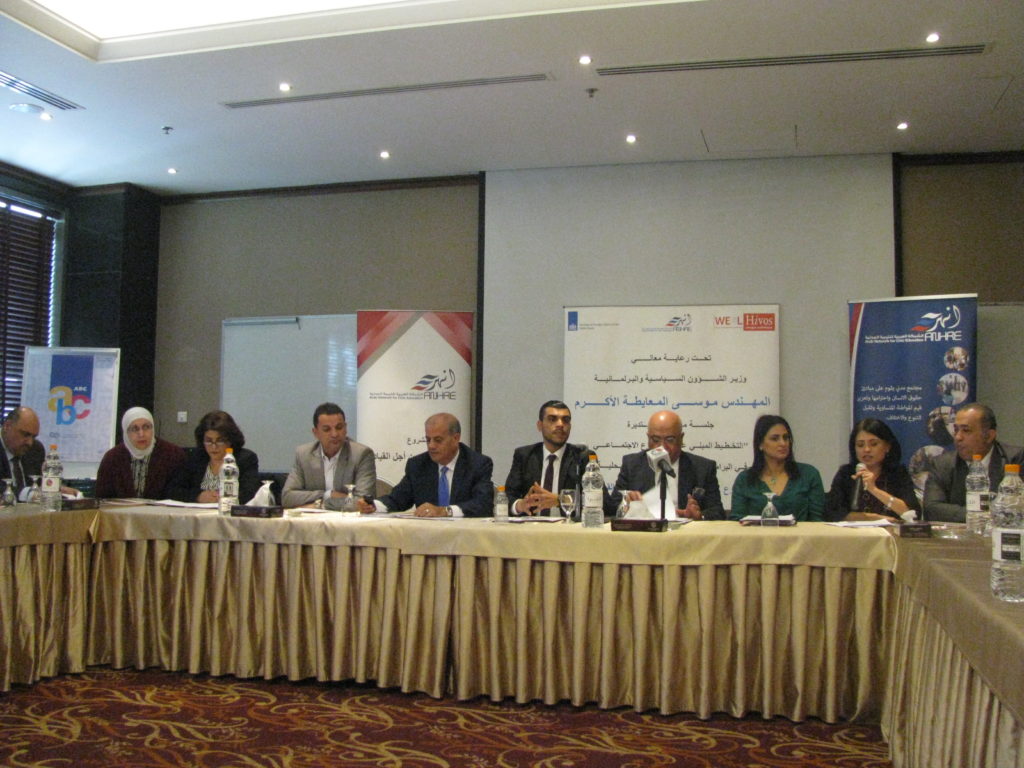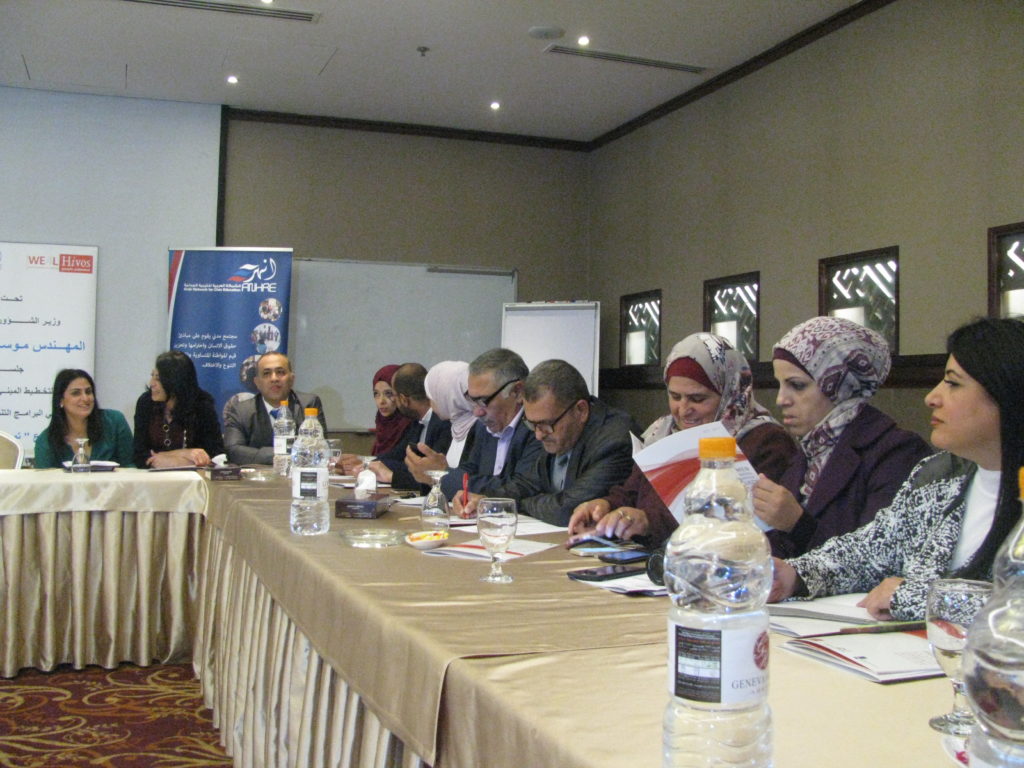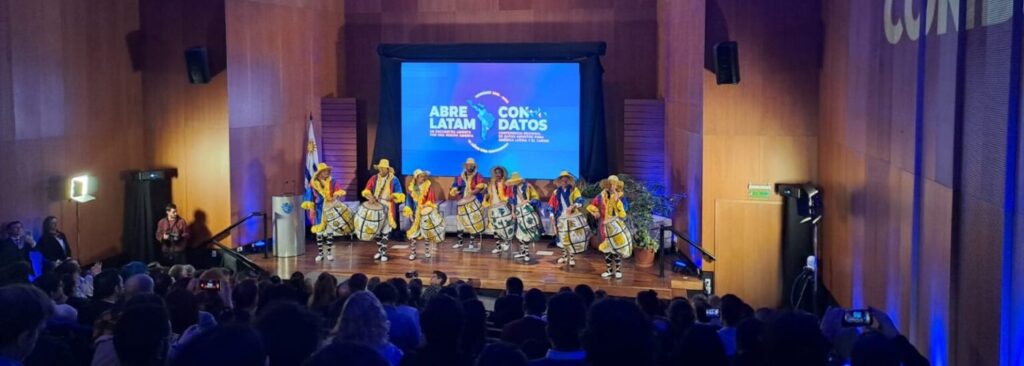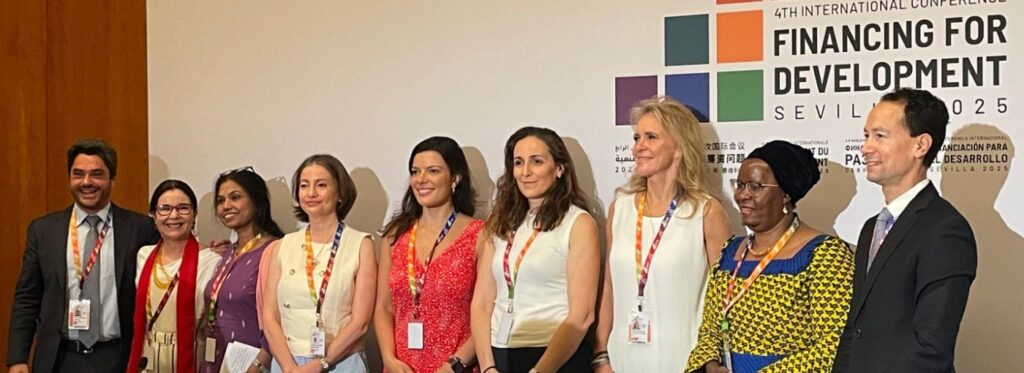id=”641″ id=”post-1949″ class=”wp-post-content-block ” itemscope itemtype=”http://schema.org/BlogPosting” itemprop=”blogPost”>

ANHRE – Discussing “gender-sensitive planning in development programs and local politics”
By: Shara Jazzar
Under the patronage of his Excellency the Minister of political and parliamentary Affairs, Eng Musa Maaytah, and within the framework of the Women Empowered for Leadership (WE4L) program implemented by Hivos in Jordan with the support of the Ministry of Foreign Affairs of the Netherlands, and on the occasion of the annual 16 Days of Activism Against Gender-Based Violence campaign and the launch of the gender-sensitive community initiatives, the Arab Network for Civic Education (ANHRE) held a round table session on “gender-sensitive planning in development programs and local politics” on 28 November, 2018 in Amman. The session aimed at discussing the mechanisms of involving the local community and women in the local decision-making process and identifying the needs of the community, taking into consideration a gender approach.
Besides Minister Musa Maaytah, the discussion was attended by a number of decision-makers at the national level including Basel Tarawneh, the Government Coordinator for Human Rights, Nuha Zaideh, the Deputy Secretary General of the Jordanian National Commission for Women, as well as decision-makers on the local level including representatives of governorates councils and heads and members of municipalities in the targeted governorates, in addition to journalists and representatives from Community Based Organizations (CBOs), and the national civil society. As such, the session was an opportunity for individuals from all layers of the Jordanian society to share their views and expertise regarding gender-sensitive planning and the importance of women empowerment in the Kingdom.
Through its gender-sensitive community initiatives, ANHRE – in partnership with Hivos – engages women into its learning approach, allowing them to explore the importance of human rights by themselves, and develop strategies to practice the values of cooperation, respect for diversity, equality, equity, respect, responsibility and acceptance in their practical lives.
In that context, the Minister emphasized on the “importance of women to become full citizens having equal rights and duties as men, because nothing differentiates between males and females other than competency.” Acknowledging the role played by the women involved in the Gender-Sensitive Community Initiatives who came from 9 governorates from all over the country – Karak in the South, Zarqa, Madaba and Balqa in the center, Irbid, Jerash and Ajloun in the north – the Government Coordinator for Human Rights, Basel Tarawneh expressed that their presence “gave a special importance to the gathering.”
From her end, ANHRE executive director, Fotouh Younes, pointed out that the women who took part in this project “were part of the decision making process, enabling their local concerns to reach decision-makers”. Younes explained that the initiative aims at “empowering women from 9 Jordanian governorates in order to influence social and political decisions and make them gender-sensitive.” This process happens through participatory planning, transfer of knowledge, collection of gender-sensitive local data in order to create a better understanding of the context, and the adoption of a participatory approach and transformative education to create awareness on values based on personal experiences and critical thinking.
Stressing on the negative impact gender-based violence has on women and their ability to actively engage in the world, Hivos country representative underlined as well the importance of allowing local communities actors “to define their needs and point at the challenges they face, as these cannot be ignored when planning national policies.”
In that framework, the Secretary General of the Jordanian National Commission for Women (JNCW), Nuha Zaideh said: “The importance of such initiatives lies in their ability to influence national decisions as sustainable development cannot be achieved without being comprehensive.”
In addition, representatives from two CBOs shared their input and experiences. Abla Al-Hajaya, head of Al-Hasa Charity Association for Orphans, expressed that her society considered her “a rebel” because women in her area are supposed to stay at home, not attend workshops in other cities in Jordan. In her opinion, there is a strong need to raise awareness as “women are not aware of their most basic rights.” In turn, Hanadi Al-Qtiesh, a member of the administrative board of Mabada in the Eyes of its Youth Foundation, thought that the “initiative should grow and become an advocacy campaign,” enabling other women to join it.
Participants also shared their recommendations, in order for ANHRE to address them with national decision-makers. Most of the persons present agreed that females should be enabled to apply and receive loans more easily, in order to become capable of implementing projects that would empower them economically. Moreover, the importance of focusing on women who were not part of the initiative was highlighted, same goes for raising awareness regarding gender-sensitive planning.
Furthermore, the need to strengthen the relation between members and organizations of the civil society in order to issue a unified shadow report to share with the Jordanian government was tackled, as well as organize discussions and meetings between Hivos partners to come out with joint or complementary initiatives. The interventions also stressed on the importance to focus on the local needs, develop comprehensive and complementary activities between civil society organizations, besides building capacities and following-up on their implementation in daily activities.
Finally, the round table discussion was an opportunity to bring several stakeholders and actors from all levels of decision-making in Jordan to discuss the importance of including local communities in developing policies and planning on a national level, while emphasizing on the role of women in mobilizing local communities and creating an autonomous space for them to promote gender equality. On top of that, it was the occasion to distribute the “Gender sensitive community initiatives booklet”, which is a detailed presentation of the community-based initiatives that are currently being implemented in the 9 targeted governorates.




